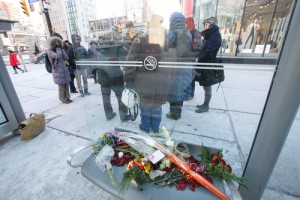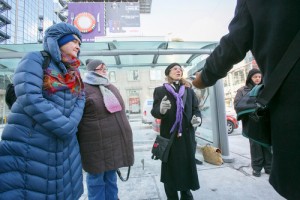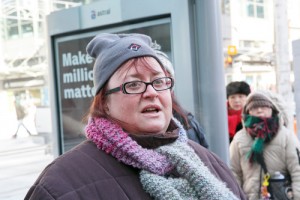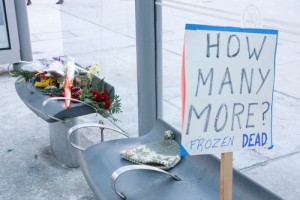
By Stuart Mann
Advocates for the poor and homeless, including an Anglican priest and a member of Holy Trinity, Trinity Square, took part in a press conference on Jan. 7 outside the streetcar shelter where a man died a day earlier during Toronto’s current deep freeze.
The shelter, located at the corner of Yonge and Dundas streets, is a short walk away from the homeless memorial outside Holy Trinity, where the names of hundreds of men and women who have died on the city’s streets are listed, some referred to simply as John or Jane Doe.
“I would just ask you to imagine dying here,” said the Rev. Maggie Helwig, the incumbent of St. Stephen-in-the-Fields, Toronto, to those attending the press conference. “Or imagine dying in a truck in a parking lot, in the dark, cold and alone” she added, referring to another man who had died in the city’s west end on Jan. 5.
“I am tired and sick at heart and do not want any more of my people to die this way,” she said. “People are dying because the wait list for affordable and supportive housing in this city is hundreds of thousands of people long. People are dying because the emergency shelters are at capacity night after night.”
Ms. Helwig, who is chair of the Diocese’s Social Justice and Advocacy Committee, urged Toronto to issue extreme cold weather alerts earlier, before temperatures reach -15C. According to the city’s protocols, an alert is made when the temperature hits -15C, not including the windchill. At that point, additional services are provided for homeless people, including the opening of drop-in warming centres and the provision of more shelter beds.

She said the city has been dragging its feet in revising its cold weather protocols, resulting in needless suffering and death. “We cannot go on like this,” she said. “It took a Twitter campaign and a sit-in at the mayor’s office to get the (warming centres) open, and as far as we know no one died on the streets last night. That’s a pretty sad situation when that’s your standard for a win.”
Tanya Gulliver-Garcia, a parishioner of Holy Trinity and a former member of the Toronto Disaster Relief Committee, said the city should automatically create more beds as soon as shelters reach 90 per cent capacity. Right now, she said, most are running well above that.
However, she said calling cold weather alerts earlier and creating more shelter beds are just Band-Aid solutions. “We need to be looking at housing and prevention and income support so that we don’t have more and more people entering the system and we can start emptying the shelters instead of continuing to build new ones. Until we have enough income for people and until we’re building housing that people can afford to live in, this problem is not going to go away.”
Ms. Gulliver-Garcia, who was homeless for a short while as a teenager, says people of faith are called by God to take action. “If you look at the teachings of Jesus, he’s talking about protecting and taking care of your neighbour. If I was outside and homeless, I would want someone to take care of me. If we’re not doing that with the most vulnerable in our society, we’re failing as Christians.”

She says people can advocate for change by taking small steps. “Write a letter to your city councillor. Write a letter to the mayor asking to open more shelter beds. Write a letter to the province to increase the minimum wage and income supports. Write to the federal government and say it’s time to get back in the business of building affordable housing. It’s about synergy and the efforts of people. As faith communities, we’re a loud voice if we want to be.”
Anglicans are helping out in other ways during the cold spell. One of the city’s warming stations, run by Margaret Fraser House, is located in the parish hall of All Saints, Sherbourne Street. The station is open to men and women overnight, and in the day they can go around the block to the church’s drop-in, which is located in the nave. At both locations, they are provided with food and other necessities.
“We’ve been busy the last couple of days, there’s no question about it,” says the Rev. David Opheim, incumbent of All Saints. He says the church has been handing out as many warm clothing items as it can get. “On Monday, we had a couple of pews full of winter coats and they were gone within the first hour. We’ve had all sorts of people drop by to donate sleeping bags and coats. Anything that people can give to us, we can certainly hand out. We can sure use them.” (Donations of warm clothing can be made at the church, which is located at the corner of Dundas and Sherbourne streets in Toronto.)
A few churches in the Diocese run or contribute to Out of the Cold programs, providing overnight accommodation to hundreds of homeless men and women every winter. Many more provide food and warm clothing through their parish outreach. Through their donations to FaithWorks, the Diocese’s annual outreach appeal, churches, corporations and individuals give more than $1 million a year to agencies and ministries that help the poor and homeless. The Diocese recently tithed $100,000 to Habitat for Humanity to build affordable housing in Scarborough.
Archbishop Colin Johnson said the death of the two men is a tragedy and the ongoing struggle to house and care for the marginalized is an issue that effects the whole of society. “The fact that there are people who are without shelter on some of the coldest nights of the year, leading to their deaths, is, frankly, a sin of our society, of which we need to repent and amend our own lives so that it doesn’t happen.”

Affordable housing and homelessness has been one of the social justice priorities for the Diocese for more than 10 years. Anglicans have passed vestry motions calling on the provincial government to make affordable housing a priority. They have met with their MPPs to discuss the need for improved affordable and supportive housing infrastructure. They have also supported the work of several ecumenical, interfaith, and secular justice organizations.
In his letter to Premier Kathleen Wynne in September of 2014, Archbishop Johnson reminded the government that “Anglican parishes throughout the Diocese have long been actively involved in supporting our neighbours who are homeless or precariously housed through the development of affordable housing projects on church lands, advocating for increased funding for supportive housing, or supporting Out of the Cold programs.”
Ryan Weston, the Diocese’s Social Justice and Advocacy consultant, said the Diocese remains committed to working with the government to put an end to homelessness. “While timely emergency responses remain critical to keeping people safe and warm in the short-term, particularly during extreme weather events, a long-term strategy to combat homelessness and marginalization requires commitment and investment from all three levels of government to build and improve affordable housing stock throughout our region, including safe and supportive housing for those living with addictions or mental health concerns. The Diocese will continue to remind all levels of government of our commitment to living out our baptismal vow to ‘seek and serve Christ in all persons and to respect the dignity of every human being.’”
Learn more about the Diocese’s Social Justice and Advocacy initiatives.